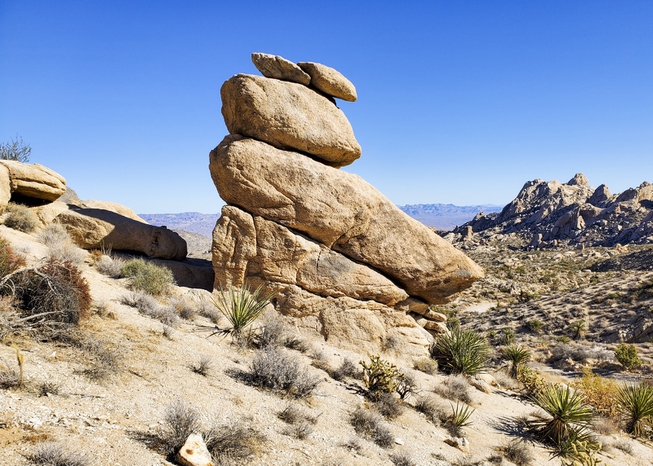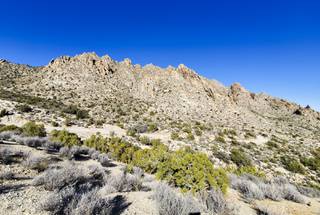
Jessica Hill
A rock formation is seen Nov. 12, 2021, in the Spirit Mountain Wilderness area in Clark County, where Avi Kwa Ame, also known as Spirit Mountain, is located. Avi Kwa Ame is a mountain and region that Native American tribes and conservation leaders are trying to protect and turn into a national monument.
Thursday, Dec. 1, 2022 | 2 a.m.
Some 450,000 acres of land around Searchlight that is culturally significant to Native American tribes is being designated as a national monument by the federal government, signaling a win for tribes and Nevada advocates who for years have sought for protections to the area.
President Joe Biden said Wednesday during the White House Tribal Nations Summit that he was committed to naming Avi Kwa Ame a national monument under authority given to him by the Antiquities Act.
The site, which is about 80 miles from Las Vegas, is considered the sacred center of creation by 10 Tuman-speaking tribes, as well as the Hopi and Chemehuevi Paiute tribes. Avi Kwa Ame translates to Spirit Mountain.
Plans to establish the Spirit Mountain site were accompanied by other announcements during Biden’s keynote address to leaders from hundreds of tribes. Those announcements included changes to how federal agencies consult with tribes, a pledge to dedicate $9.1 billion of the national budget for Native American health care services, and initiatives to restore Native languages.
“When it comes to Spirit Mountain, and its surrounding ridges and canyons in Southern Nevada, I’m committed to protecting this sacred place that is central to the creation story of so many tribes that are here today,” Biden said before a round of applause by attendees. “There’s so much more we’re going to do to protect the treasured tribal lands.”
The news was in addition to a separate announcement Wednesday by the Department of Commerce’s’ National Telecommunications and Information Administration, which said it had awarded $11.6 million to expand high-speed internet access to the Duckwater Shoshone, Walker River Paiute and Fallon Paiute Shoshone tribes.
Biden gave credit to the efforts of Dina Titus, the longtime Nevada congresswoman who in February introduced a bill seeking to add Avi Kwa Ame to the registry of federally protected historical sites.
“I’m just ecstatic because it means so much to so many people,” Titus told the Sun. “And so many people have worked so hard to see this come to fruition. And having him (Biden) announce it at the tribal summit with the Secretary of Interior (Deb Haaland) and so many members of tribes from across the nation who were excited about it, it was just so perfect.”
Titus said Biden would likely make a visit to Avi Kwa Ame early next year, where the president will formally designate the mountain a national monument, though she declined to speculate when that might be.
In tandem with the other initiatives revealed by Biden at Wednesday’s summit, Titus — who has also backed conservation efforts aimed at protecting Gold Butte and Basin & Range, as well as Tule Springs — credited Biden for an unprecedented effort to bring positive change in tribal communities.
“When you look at the list of things that he has accomplished, I don’t know any president who’s done more for Native Americans in terms of investing in mental health, education or workforce development,” said Titus. “As well as respecting their culture, their history and their language.”
Timothy Williams, chairman of the Fort Mojave Indian Tribe, said in a statement he was “grateful the area will remain protected,” and thanked Titus for advancing the issue at the federal level.
“Knowing our future generations will have the freedom to continue our cultural and religious practices as we have since time immemorial is both a model of inclusivity and a promise to honor the strength of Nevada’s diversity,” Williams said.
Beyond being the site of creation for the 12 above tribes, Avi Kwa Ame also serves as a place to gather sacred medicines and to trade with other tribes. It’s also part of the Salt Song Trail for Southern Paiute tubes, which tells the traditional life cycle of the Southern Paiute people.
“Establishing a new National Monument at Avi Kwa Ame will safeguard an area of cultural importance to Tribal nations that is rich with wildlife and incredible natural beauty,” U.S. Sen. Jacky Rosen, D-Nev., said in a statement. “I’ve firmly supported the movement to honor Avi Kwa Ame, and this welcome announcement from the President will ensure that this land remains permanently protected in Southern Nevada.”
U.S. Sen. Catherine Cortez Masto, D-Nev., added that “this national monument has widespread support and is a key part of our work to protect our environmental and cultural resources.”
In the late 1990s, the mountain and its surrounding 48,000 acres were designated as a traditional cultural property on the National Register of Historic Places. A couple of years ago, a company proposed using the area as a wind farm with a project known as the Crescent Peak Wind Project, but the proposals were denied.
When the Crescent Peak Wind Project proposal was rejected, the Fort Mojave Indian Council passed a resolution in September 2019 and sent a letter to the Nevada congressional delegation requesting that the area be protected as a national monument.
In 2020, national and local conservation groups launched a public awareness campaign to garner support.
Efforts to protect the area were renewed in 2021, when Crescent Peak Renewables LLC submitted another application to the Bureau of Land Management for a 308-megawatt wind farm called the Kulning Wind Energy Project, which would be located nine miles west of Searchlight.
Those efforts to develop the land were met with swift opposition. In February, Clark County Commissioner Michael Naft introduced a resolution supporting designating Avi Kwa Ame as a national monument. In a statement Wednesday, Naft said the federal designation would preserve Nevada’s natural beauty and inspire recreationalists from all over to visit the spot.
“We invest in this land not only because it is the right thing to do for future generations, but it is truly the prudent financial move as well,” Naft said in the statement. “Nevada’s outdoor recreation economy supports 49,000 jobs and generates $3.9 billion for the state in annual economic activity.”
The Boulder City Council unanimously passed a resolution in support as well as the Searchlight Town Advisory Board. And last November, the Laughlin Town Advisory Board voted 3-1 to support the designation of Avi Kwa Ame National Monument.
Also Wednesday, Jill Lagan, CEO of the Boulder City Chamber of Commerce, also lauded Biden’s move, saying the designation could be a boon for tourism.
“As a champion for business in Southern Nevada, the Boulder City Chamber of Commerce sees the opportunity to invite tourists to our area to learn more about exploring, discovering and unwinding in the unspoiled Avia Kwa Ame,” Lagan said in a statement. “As stewards of this great land, we are indeed willing to educate the visitors and locals on the history and conservation efforts happening in this neighboring wilderness and look forward to enjoying this great hallmark of the past, present and future.”

